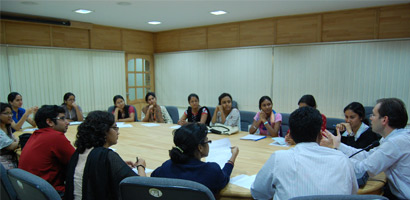Group Discussion Related Topics
What form of democracy is better for India – Parliamentary or Presidential?

Parliamentary:-
- Since the majority party or a majority coalition of several parties come to power in a Parliamentary democracy, there is bound to be cooperation and harmony between the Executive and the Legislature.
- It ensures easy implementation of plans and policies of the ruling party for it can have its own way, no matter what the opposition parties in the Lok Sabha say. In the Presidential form, on the contrary, the system of preparation of powers between the Executive and Legislature often leads to conflict- more so, if these two wings of the government are controlled by different parties.
- India adopted by the Parliamentary form of democracy after getting Independence in 1947 because India had been familiar with its working during the days of the British rule.
- Moreover, while in a parliamentary democracy the Executive is responsible to the Legislature and therefore, the opposition always keeps it on the alert for it "always lives in the shadow of a coming defeat " as Laski points out, in a Presidential democracy the President does not have to fear any opposition because he is not responsible to the legislature.
- If the ruling party fails to deliver and carry the majority with it in a Parliamentary democracy the opposition more than mere exposing its drawbacks, loopholes and blunders tries to step into its shoes without necessarily having to force the ritual of a fresh election. A fixed tenure of office for a President does not make this possible in a Presidential democracy.
- Parliamentary democracy suits us because here persons to be the members of the Executive make known their sagacity, political acumen, grasp and common sense, and the Prime Minister will always be one who has undergone a long and strenuous period of political apprenticeship.
- India has been the most stable nation of Afro-Asia. The main factor contributing to our stability has been the holding of periodic general elections since, 1952. Government seeks to correspond to the desires of the electorate.
- Members of the Legislature who represent prevailing tendencies and opinion of the nation apprise the cabinet of them. Cabinet or the ruling party ignore or brush aside them only at its own peril.
- Presidential democracy, on the other hand, has nothing much care for a shift in public opinion because the fixed term of office of the President makes him secure in office for the stipulated number of years.
- Therefore, we must not give up our system of government just because of some faults and undemocratic tendencies of the part of the powers that be.
Presidential:-
- In a Presidential democracy, a continuous and consistent home and foreign policy can be followed because the chief executive enjoys security of tenure and cannot be easily removed. Contrary to this, in a Parliamentary democracy, there is no continuity or consistency of policies because of instability of Government. A new cabinet may even reverse the policy followed by its predecessor.
- Presidential system ensures that the President has a national image. He does not belong to this or that group or faction in the Legislature.
- Since he is elected for a fixed term of office, stability is in built in this form of Government because he is not dependent of the vagaries of the Legislature.
- In a parliamentary Government, on the other hand, the Prime Minister has to please both of his party men and the opposition to continue in office. The time has come for us to switch over to the government of experts, as the Presidential Government is called instead of the government of armatures or the Parliamentary democracy.
- The President is authorized to appoint the members of his cabinet irrespective of party affiliation.
- A Prime Minister, on the other hand, is bound to appoint only members of his party or of parties supporting him.
- In a presidential system, bureaucratic appointments are made by the President, and in some cases, with the approval of the Legislature. They are responsible for their acts of omission and commission.
- In a Presidential democracy, the Legislature is less likely to be dominated by party spirit and the individual members can vote independently on the issues presented to them.